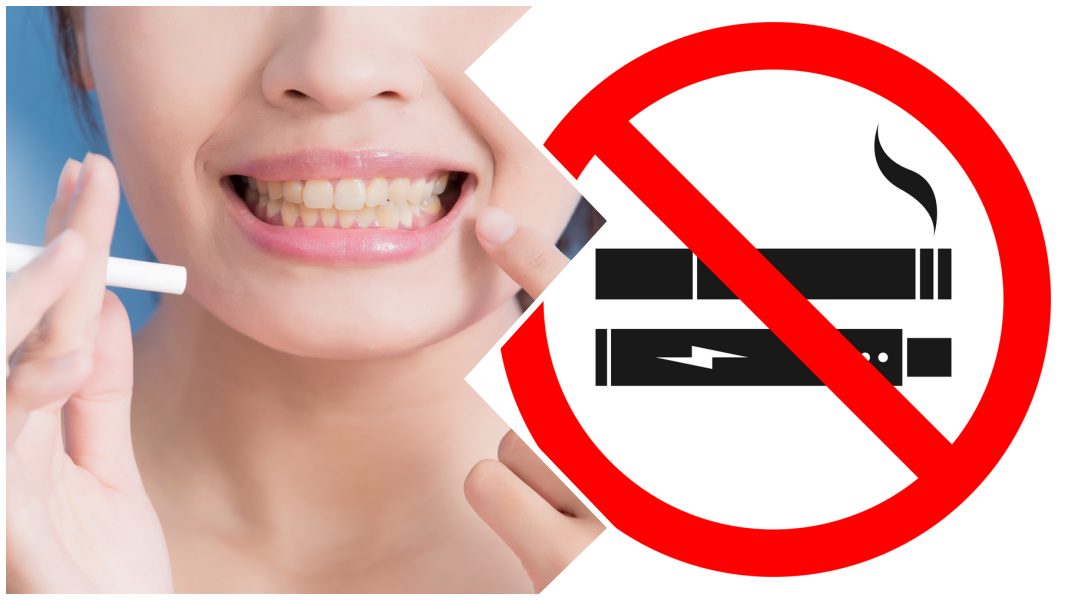While the association between smoking and lung cancer is well-known, the detrimental impact on dental health, particularly on gums, is a topic that deserves attention. In this article, we’ll delve into the smoke-filled realm of oral health and explore how smoking contributes to gum disease and other dental issues.
The Effects of Tobacco On Gum Health
Gum Disease (Periodontitis)
Smoking is a significant risk factor for gum disease, a condition that affects the supporting structures of the teeth, including the gums and jaw bones. The chemicals in tobacco smoke create a conducive environment for bacteria to thrive along the gumline. As these bacteria multiply, they form a sticky film known as plaque. When left untreated, plaque hardens into tartar. The body’s immune response to this bacterial invasion can lead to inflammation and infection, ultimately causing gum disease.
Reduced Blood Flow
Smoking constricts blood vessels, limiting the flow of oxygen and nutrients to the gums. This reduced blood supply compromises the ability of the gums to heal and fight off infection. As a result, smokers are more susceptible to persistent inflammation and delayed recovery from dental procedures.
Nicotine’s Impact
Nicotine, a highly addictive component of tobacco, is known to constrict blood vessels, reduce saliva flow, and impair the body’s ability to fight infection. These factors collectively contribute to the progression of gum disease, making it more challenging for smokers to maintain optimal oral health.
Delayed Wound Healing
Whether it’s a routine dental cleaning or a more extensive procedure, smokers experience delayed wound healing compared to non-smokers. This impaired healing process can increase the risk of postoperative complications and hinder the success of dental interventions.
Beyond the Gums: Other Dental Issues
Staining and Discoloration: The cosmetic impact of tobacco smoke on teeth is evident in the yellowing and staining caused by tar and nicotine. Regular dental hygiene practices alone may not be sufficient to counteract the discoloration, requiring additional interventions such as professional teeth whitening.
Bad Breath (Halitosis): Tobacco smoke contributes to bad breath by drying out the mouth and promoting bacterial growth. The persistent odor is not only a social concern but also indicative of an unhealthy oral environment.
Is Vaping Bad for Your Dental Health?
While vaping is often marketed as a safer alternative to traditional smoking, emerging evidence suggests otherwise. Studies show that vaping may still have adverse effects on dental health. Vaping involves inhaling an aerosol, commonly referred to as vapor, produced by an electronic cigarette or similar device. Let’s explore how vaping can impact your dental health:
Dry Mouth: Many e-cigarettes contain propylene glycol, which can contribute to dry mouth. Saliva plays a crucial role in maintaining oral health by rinsing away food particles, neutralizing acids, and preventing bacterial overgrowth. A dry mouth environment can increase the risk of cavities, bad breath, and gum issues.
Nicotine and Blood Flow: Nicotine is a common component in e-cigarettes, and it can lead to vasoconstriction, a narrowing of blood vessels. Reduced blood flow can compromise the ability of the gums to receive oxygen and essential nutrients, potentially contributing to gum disease.
Inflammation and Irritation: The heat and chemicals in the vapor can irritate oral tissues, leading to inflammation. Persistent inflammation is a precursor to various oral health issues, including gum disease.
Increased Bacterial Adhesion: Studies suggest that vaping may increase the adhesion of harmful bacteria to tooth surfaces. This enhanced bacterial adhesion can contribute to the formation of dental plaque, a sticky film that, when left untreated, can lead to cavities and gum disease.
Impact on Soft Tissues: The oral mucosa (soft tissues in the mouth) can be adversely affected by the chemicals present in e-cigarette vapor. This can manifest as irritation, dryness, or other soft tissue abnormalities.
Staining Teeth: Although vape liquids for e-cigarettes do not contain tar, the nicotine itself can cause staining over time. This is more noticeable with vape flavors of darker colors. Frequency and oral hygiene habits also play a role in the level of staining.
Risk of Bruxism: Some users may experience increased teeth grinding (bruxism) as a result of nicotine exposure. Bruxism can lead to tooth wear, jaw pain, and other dental complications.
Research on the long-term effects of vaping on dental health is still evolving, and the full spectrum of potential risks is not yet completely understood. However, early evidence suggests that, like traditional smoking, vaping may have negative consequences for oral health.
While vaping might be considered a less harmful alternative to smoking, it is not without its dental health issues.
Is Smoking Bad for Your Oral Health?
In the intricate dance between tobacco and dental health, it’s evident that smoking, which includes vaping, is a major disruptor. From gum disease to delayed wound healing and cosmetic concerns, the impact of smoking on oral health is far-reaching. Quitting smoking is undoubtedly the most effective step towards preserving and enhancing dental well-being.
Coupled with regular dental check-ups, a commitment to a smoke-free, vape-free lifestyle can pave the way to a healthier, brighter smile that stands the test of time. Your gums, teeth, and overall oral health will undoubtedly thank you for breaking free from the clutches of smoking.
Choose Health, Break Free from Smoking!
Now that you’ve uncovered the intricate dance between smoking and dental health, it’s time to take charge of your well-being. Your oral health is a crucial component of your overall health, and making the decision to quit smoking can lead to transformative changes. Here’s your call to action:
- Commit to Quit: Make a pledge to break free from the grip of tobacco. Whether you’re a long-time smoker or considering quitting, now is the perfect moment to embark on a smoke-free journey.
- Seek Support: Quitting smoking is a commendable but challenging endeavor. Reach out to friends, family, or support groups to share your decision and seek encouragement. Professional help, such as counseling or smoking cessation programs, can provide valuable assistance in your journey.
- Prioritize Dental Check-ups: Schedule a dental check-up to assess the current state of your oral health. Your dentist can offer guidance, personalized advice, and professional assistance in addressing any issues related to smoking’s impact on your teeth and gums.
- Embrace Oral Hygiene: Cultivate a robust oral hygiene routine. Brush your teeth twice daily with fluoride toothpaste, floss regularly, and use an antiseptic mouthwash. Good oral habits are key to maintaining a healthy smile.
- Educate Others: Share the knowledge you’ve gained about the dangers of smoking on dental health. Encourage friends and family to prioritize their oral health and consider the impact of tobacco on their smiles.
- Celebrate Milestones: Recognize and celebrate your achievements along the way. Whether it’s a day, a week, or a month without smoking, each milestone is a step toward improved health.
Remember, the journey to better oral health begins with a single step. By choosing health over smoking, you’re not just improving your dental well-being but enhancing your overall quality of life. Your brighter, healthier smile awaits—take the first step today!

Let’s get your teeth back in shape!
Take proactive steps to reclaim your dental health from the effects of smoking. Call Dr. Trujillo in Phoenix, AZ, for a personalized treatment plan. Your journey to a healthier smile begins now!





